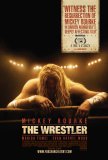Wrestler, The (United States, 2008)

The film with the loudest buzz at the 2008 Toronto Film Festival was Darren Aranofsky's The Wrestler - quite a change for the man who brought The Fountain to the same venues a couple of years ago to almost universal indifference. The Wrestler, on the other hand, excited interest from all corners and, just before its first screening, it was announced that Fox Searchlight had purchased the North American distribution rights. Almost immediately, the studio's publicity department went into overdrive, and for good reason. This is the kind of film that inevitably will excite awards talk - for Mickey Rourke (Best Actor), for Marisa Tomei (Best Supporting Actress), for Aronofsky (Best Director), and for the film (Best Picture). It's redemption for the filmmaker, who has regained the "critics' darling" label applied to him following his debut feature, Pi and its forceful follow-up, Requiem for a Dream.
Rourke, in what may be the defining performance of a rocky career that appeared to have hit rock bottom, plays Randy "The Ram" Robinson, a one-time wrestling great who has been relegated by the rigors of declining health and advancing age to performing in small venues and doing autograph signings. Randy dreams of one day regaining his glory of 20 years ago, but even a lyric from a song on his radio - "Don't know what you got till it's gone" - tells a different story. When a heart attack fells Randy after a low-level bout, the doctor's advice is unequivocal: give up wrestling or risk death. This compels Randy to re-assess things. Is life without wrestling - even what passes for "wrestling" at this stage of his career - any kind of life? He gets a job at the deli counter of a local supermarket, makes attempts to re-connect with his estranged daughter (Evan Rachel Wood), and tries to start a relationship with a stripper (Marisa Tomei) with whom he is friendly. The stripper's story parallels Randy's. Both are past-their-prime performers who find their services in ever-decreasing demand. (Note: Kudos to Aranofsky for showing a stripper who actually takes her clothing off, and to Tomei for performing the requisite nudity. Coupled with her work in last year's Before the Devil Knows You're Dead, Tomei has successfully shed a reputation for on-screen prudishness.)
As character studies go, this one is among the most powerful and compelling I have seen in some time. The film is meticulous in the ways it delves into Randy's life, and it does so with verisimilitude and a lack of melodrama. The film provides a cornucopia of fascinating information about the behind-the-scenes goings-on at professional wrestling matches - how the violence may be choreographed but is often real. If this doesn't reflect what really happens, it is presented in such a way that it's completely believable. But this is icing on the cake. The meat of the story reflects Randy's attempts to cope with what he has become and the delusions that keep him going. His honest but flawed attempts to regain a place in his daughter's life are pathetic and heartbreaking. He has hurt her in ways we can only begin to imagine but, in one touching scene, we see that there is hope - at least for a flickering, fading instant. The Wrestler is like that: a mixture of hope and despair for someone that time has forgotten and deigns not to remember.
Aronofsky's directorial style is simple and spare. There are no flourishes or attempts to convince us that he is a master of his craft. The straightforward approach works best, recalling a documentary without mimicking it. At many times, the perspective is that of a "fly on the wall." We're with Randy in his trailer or in the prep room before a match or in the ring. The immediacy is almost unsettling at times.
Mickey Rourke, who has been flying under the radar for nearly two decades, makes this a comeback to remember. Admittedly, Rourke has never quit acting. In fact, his filmography shows more than 30 credits since his heyday in the late '80s and early'90s. With some notable exceptions (Sin City, for example), most of those have not been roles to brag about. Randy is Rourke's first fully three-dimensional individual in a long time, afflicted not only with the foibles common to human beings, but the better impulses as well. He is in many ways a sad case - a man whose entire identity and self-worth are defined by the sport that has ruined his health and cast him aside. He lives in a trailer park in Northern New Jersey and can't make the rent. His daughter despises him. He lives for the adulation of those few fans who still remember him. Rourke does not play Randy as someone who craves pity; he holds his head high and rolls with the punches (both literally and figuratively), even when they leave him broken and bleeding.
It's not hard to understand why The Wrestler is getting so many plaudits from across the critical landscape. Even coming out as it is in the mid-December crowd of would-be Oscar contenders, it distinguishes itself. For Aronofsky, it's easy to forgive The Fountain, if this is what comes from the hard lessons he learned following that minor misfire. Whether The Wrestler wins any awards is beside the point - the fact that it's worthy of them is all that should matter to movie-goers who care about connecting with a unique and complex screen protagonist.
Wrestler, The (United States, 2008)
Cast: Mickey Rourke, Marisa Tomei, Evan Rachel Wood
Screenplay: Robert D. Siegel
Cinematography: Maryse Alberti
Music: Clint Mansell
U.S. Distributor: Fox Searchlight
U.S. Release Date: 2008-12-17
MPAA Rating: "R" (Violence, Profanity, Nudity, Sexual Situations)
Genre: DRAMA
Subtitles: none
Theatrical Aspect Ratio: 2.35:1
- Informers, The (2009)
- Expendables, The (2010)
- (There are no more worst movies of Mickey Rourke)

Comments